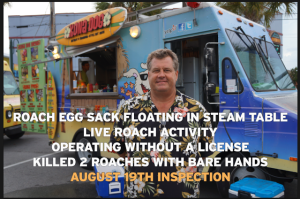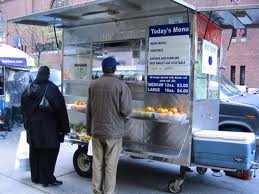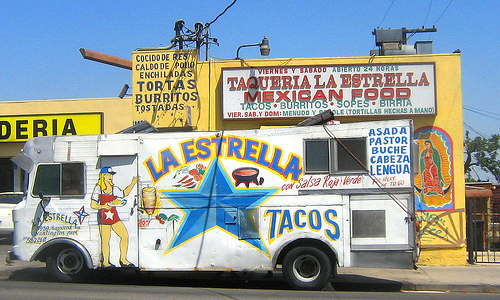Food trucks are not some glamorized version of nirvana that Jon Favreau can make into a movie.
 There are food safety risks, and they are magnified by the small space and hipster environment of a food truck.
There are food safety risks, and they are magnified by the small space and hipster environment of a food truck.
Megan Woolhouse of the Boston Globe called me a couple of weeks ago (megan.woolhouse@globe.com) and I told her what I thought.
(It’s amazing that reporters can track me down in Australia, but Kansas State University decided I was not on campus so couldn’t do my job, as they moved toward distance education; my guess is the cattle farmers that fund Kansas didn’t like the things I was saying publicly. Whatever. So far over it.)
Megan writes: They’re restaurants on wheels, churning out everything from pan-seared dumplings to juicy porchetta sandwiches for the city’s hungry lunchtime crowds.
But food trucks, which are proliferating at a rapid pace around Boston, are more likely to be temporarily shut down for serious health violations than their brick-and-mortar counterparts, most commonly for violating a basic requirement for proper sanitation: running water.
A Boston Globe review of 2016 city health records found that while food trucks were less likely overall than restaurants to have violations, they were more likely to be suspended for serious issues that pose an “imminent public health threat.’’ Nine of the city’s 96 licensed food trucks last year were closed on the spot until the violations were corrected, usually within a week or two. By comparison, two of every 100 restaurants were suspended.
A recent E. coli outbreak that shuttered several food trucks operated by the Chicken & Rice Guys has raised questions about whether these movable feasts are as safe as traditional restaurants.
Food trucks in Boston were cited for violations 200 times in 2016, and of that total, about half were serious infractions, and the other half minor. A majority of the most serious violations that led to temporary suspensions were related to water, or the lack of it.
On board some trucks, the water tank was empty or a sink or pipe leaked, so employees were not able to rinse vegetables and surfaces or wash their hands, as required by health regulations.
City inspectors closed The Savory Truck outside Brigham and Women’s Hospital in April 2016 after inspectors found condensation dripping into food and no water for employees to wash their hands, according to city inspection reports.
The next day, officials temporarily shuttered Saigon Alley, a food truck specializing in Vietnamese fare in the Financial District. Health inspectors said there was “no evidence of handwashing due to broken pipes at handsink.”
The Clover food truck parked at Dewey Square was ordered to close immediately last October. Once again, the issue was water.
In 2013, Clover voluntarily pulled its trucks off the road after a salmonella outbreak affected 12 people, at least half of whom ate at one of its restaurants or food trucks. Salmonella bacteria can cause diarrhea, fever, and abdominal cramps, and in severe cases, hospitalization.
On the Rose Kennedy Greenway, customers lined up for lunch at a food truck.
Water and hand-washing are fundamental to keeping harmful bacteria at bay in any food establishment, but even more critical on a food truck, said Doug Powell a former professor of food safety at Kansas State University and an author of barfblog.com, which chronicles foodborne illness outbreaks.
In a small space, washing takes on more importance because bad bacteria can spread more quickly. Cutting surfaces on the trucks are used for a variety of tasks, he said, and workers who serve food might also collect payments.
The rolling restaurants are also not connected directly to a city’s water supply and rely instead on a water tank connected to a sink, much like on a boat or airplane. Water can simply run out, and finding places to refill poses another dilemma, so workers might cut corners to conserve it.
“All of those health problems get magnified in a smaller space on a food truck,” Powell said. “So you really have to be good at what you’re doing.”
The problems have come to light as food trucks soar in popularity. The number of trucks in Boston grew from 14 in 2010 to 96 in 2016.
Trucks generally operate without significant problems, and the industry has long argued that they are as safe as — if not safer than — restaurants.
Matt Geller, president of the National Food Truck Association, said, “We see E. coli outbreaks in restaurants, so it’s not about the vehicle or the food. It’s about the particular operation.”
That’s idocracy.
E. coli, Salmonella and Listeria are almost always about the ingredients that restaurants source.
They have no fucking clue.









.jpg) both teams didn’t suck.
both teams didn’t suck. end hamburgers continues: Parisians are paying 29 euros, or just over $36, for the popular burger at Ralph’s, the Hamptons-Wyoming-chic restaurant in the palatial Ralph Lauren store.
end hamburgers continues: Parisians are paying 29 euros, or just over $36, for the popular burger at Ralph’s, the Hamptons-Wyoming-chic restaurant in the palatial Ralph Lauren store. snack — explained Capt. Brian Mullen, commanding officer of the 33rd Precinct.
snack — explained Capt. Brian Mullen, commanding officer of the 33rd Precinct. grade based on food inspections — in what may be the ultimate sign that this faddiest of food fads is going mainstream.
grade based on food inspections — in what may be the ultimate sign that this faddiest of food fads is going mainstream.